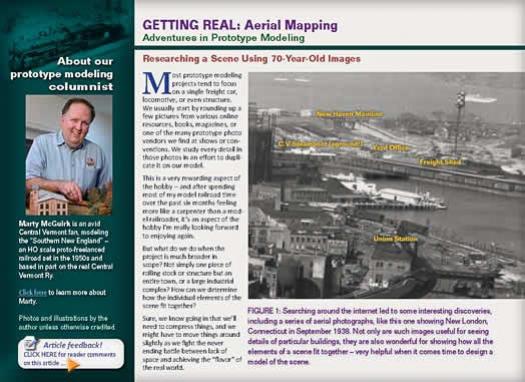Home / Model Railroad Hobbyist - free magazine (all issue feedback) / MRH 2009 issues / MRH issue 04 - October 2009 / Column - Getting Real
Column - Getting Real
Please post any comments or questions you have about this article here.
>> Posts index
Navigation
Journals/Blogs
Recent Blog posts:

Comments
Aerial Mapping
This article couldn't come at a better time for me. I've been trying to take a look at the actual tracks leading from the Bay Ridge carfloat aprons up to Maspeth Yard for the last couple of months. It is virtually impossible to see most of them in any other way since Brooklyn has a number of roads tha pass over the tracks in many places. These overpasses usually feature walls on either side of the stree that prevent on from seeing what is happening down below.
The right of way is also blocked off by buildings and residences and other walls as well. Now you might suspect all of this was put into place in the wake of September 11, 2001, but that isn't the case at all since they go back quite a ways. I first came in contact with this phenomenon back in the 1960s when I went to Brooklyn College. The college looked diffrent back then since there was road that ran around the entire college campus and bordered the tracks of the Long Island Railroad.
In efect the only way to follow the tracks is to view aerial shots of the areas but one still needs to realize that one has to know how old the shots are because there have been some changes to the track plans over the last century. Google helps but you need to know the exact areas you want since the track plans don't run straight and in some places actually run through short tunnels as well. In fact, I think Marty might want to follw up this aticle with one on using Google to do some research as well.
Irv
A great article
I'm only about halfway through reading this, but I wanted to compliment Marty on a fantastic bit of work! I hope that further articles on researching prototypes could be done (i.e. acquiring data on how your prototype operates, strategies on how to learn what commodities are consumed/produced by industries, typical motive power usage, etc.) as this article used a great example that can be applied to a lot of different applications.
Great Article Marty!
----------------------------------------------------------------------------------------------------------------------------------------------
~Rich
Proto-Freelanced Carfloat Operation, Brooklyn, NY c.1974
BEDT?
Have you changed prototypes? If so I think we might be able to share info.
Irv
I have!
I have!
I actaully have a new blog entry that I'm finishing up that touches on that (free time is at a premium for me these days) but my proto-freelance layout is going to end up much more like the BEDT than the Hoboken shore in terms of motive power, industries and operating scheme.
I'd love to discuss anything you have to share, drop me a PM and we can exchange info via email (prefer not to put it in a public forum)
Thanks
~rb
----------------------------------------------------------------------------------------------------------------------------------------------
~Rich
Proto-Freelanced Carfloat Operation, Brooklyn, NY c.1974
Appreciate the comments
Frankly I wasn't sure how this article would be received. Of course, another CV modeler found it useful (big surprise there!) - Don't worry, I have a few more tips and resources to share in future columns.
I was going to delve more into using Google Maps and Live Earth (at Bing.com) - it's really amazing how much of the railroad is still visible from the air in those search engines.
Marty McGuirk, Gainesville, VA
www.centralvermontrailway.blogspot.com
A case study
Hi Marty-
In my opinion, this was one of the best columns I've seen in the magazine yet. It gave the reader general ideas about how to improve their layout while using a generic, yet specific example. If I could suggest, I would love to hear about how one would go about researching the operations of a prototype. I'm looking at mdoeling a portion of the D&H in the late 1970's and have little to no idea how I would go about getting information on what typical operations were like. Outside of joining a relevant historical society or buying a few books from Morning Sun, I was looking to find out what some of the less obvious ideas were out there.
Thanks again for your article!
~rb
----------------------------------------------------------------------------------------------------------------------------------------------
~Rich
Proto-Freelanced Carfloat Operation, Brooklyn, NY c.1974